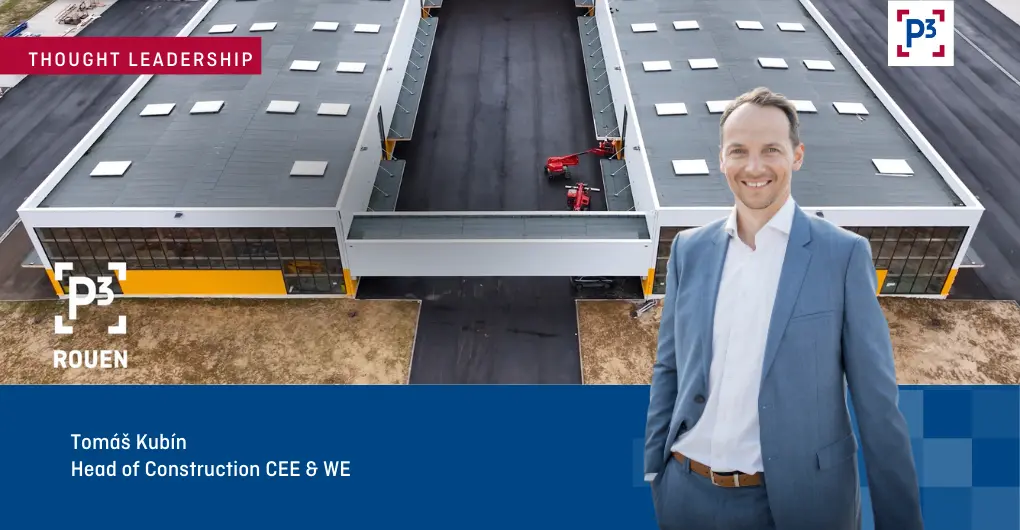

Innovative French pilot scheme slashes carbon emissions for customer at brownfield site
P3 has dug deep to provide a customer in Rouen, northern France, with a clean, limitless supply of energy that makes truly environmentally-friendly power a reality. In a pilot project, the pan-European warehouse owner and developer is delivering the first-ever geothermal supply for one of its properties.
Geothermal energy is heat that occurs naturally, deep beneath the Earth’s surface. But harnessing it economically in a way which makes business sense is a challenge, globally, meaning it’s an underutilised part of many countries’ energy mixes, today. In France, geothermal energy comprises only 1.7% of renewable energy production, and 1% of heat consumption, nationwide.
As part of the innovative project, P3 hired energy efficiency expert, Accenta, to dig down into the earth to access geothermal heat. Pipes carry it from 200 meters underground, up into P3 Rouen, providing 77% of the new building’s heating needs, with the remainder provided by an air-source heat pump.
The system is called Borehole Thermal Energy Storage (BTES,) which is an all year-round thermal energy storage system based on a geothermal probe field. In summer, when cooling requirements are high, waste heat from air conditioning is stored underground using geothermal probes. In winter, it is recovered from the ground via heat transfer using the probes, and heats the building. The heat is carried by water in the pipes, at temperatures of between -3 and 40°C, with a maximum geothermal output of approx. 365kW.
Additionally, the platform will also be equipped with on-site self-consumption solar panels, aiming for even greater sustainability.
At around the same time as P3 and partner La Poste Immobilier added clean geothermal power to P3 Rouen – a new 19,000 m2 logistics centre on a former brownfield site – big tech giant Google made headlines in the US for its first-ever successful geothermal project.
Tomáš Kubín, P3’s Head of Construction for CEE & Western Europe, hailed the success at P3 Rouen. “This fits perfectly with our customer-focused approach and demonstrates that we don’t only do easy tasks; we also do difficult, non-standard projects for the benefit of the clients at the heart of our business,” he said.
Cool on heat
Despite its obvious environmental benefits, geothermal is currently held back from wider adoption by uncertainties which mean it’s often a less appealing renewable option than solar or wind energy.
Upfront capital investment costs are high by comparison with other renewables, and variables like a property’s location, condition and layout, all weigh heavily on how suitable geothermal is as a power source.
The current low rate of adoption also means there’s a lack of data for geothermal energy, compared to the likes of solar power. In contrast, there is plenty of data available on how many days of sunshine to expect annually in European countries, which makes solar predictable. It’s also harder to calculate how much geothermal energy can be sold to national grids. These factors and others increase the risk of adopting geothermal for many industrial occupiers.
Nicolas Camus, Head of Construction for P3 in France, said: “With this project we had to be innovative because the new property has high heating requirements, and we navigated the path towards minimizing our impact on the environment and reducing CO2 emissions linked to heating the building by around 90%. There was a lengthy and detailed planning process in close collaboration with our customer, and we’re proud that we proved there is a use-case for sustainable, geothermal heating in the logistics sector.”
Data matters
It is hoped this successful pilot scheme at P3 Rouen will contribute to making geothermal energy a good choice for more tenants, by providing new data for building accurate business cases in future.
“What we really need is data; then it’s possible to work out whether to implement geothermal elsewhere in a portfolio,” said Kubin. “Data is the starting point for any technology which we think may be useful, and a pilot scheme like at P3 Rouen will provide that.
Kubin explained: “There has to be a strong business case which is clear about how to recoup the costs, as you don’t want to misallocate capital investment. But currently, there’s often a lot of guesswork with unknown values. It’s the economics that hold geothermal back currently, however that may change quickly.”
In France, awareness of geothermal as an energy option is growing. The French High Commissioner for Planning published a report about its benefits in October 2022. In a bid to accelerate adoption, the Minister for Energy Transition unveiled an action plan earlier this year for embracing an energy source still perceived as new and uncertain by the public and decision makers.
The innovative pilot scheme at P3 Rouen places the new warehouse in the vanguard of clean energy adoption in France and across Europe.
“Geothermal is unique in the energy mix, and as environmental legislation becomes ever stricter for assets, we need to be across it as a renewable source,” said Kubin. “There’s clear value in future-proofing assets, and we must always understand our customers’ needs.
“This project is a clear statement of P3’s commitment to cutting our environmental impact by innovating in the modern warehouses we deliver for customers. If we can help reduce a property’s carbon footprint, then we are happy to do so.”